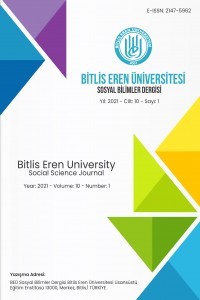EĞİTİM GEÇMİŞLERİ İLE KAZANÇ DÜZEYLERİ ARASINDAKİ İLİŞKİYE YÖNELİK ÖĞRETMEN ALGILARI
İnsan Sermayesi, Tanımlama, Eleme Hipotezi
-
Human Capital, Signalling, Elimination Hypothesis,
___
- Akerlof, G. (1976). The economics of caste and of the rat race and other woeful tales.
- Quarterly Journal of Economics 90, 599–617. Akyüz, Y. (2001). Türk eğitim tarihi (başlangıçtan 2001'e). İstanbul: Alfa Yayınları.
- Albayrak, A. S. (2006). Uygulamalı çok değişkenli istatistik teknikleri. Ankara: Asil Yayın Dagıtım.
- Arkes, J. (1999). What do educational credentials signal and why do employers value credentials?. Economics of Education Review, 18, 133-141.
- Balcı, A. (2004). Sosyal bilimlerde araştırma. Ankara: Pegem A Yayıncılık.
- Becker, S. Gary (1993). Human capital: A theoretical and empirical analysis, with special reference to education. Chicago: University of Chicago Press.
- Benfield, C.R. (2000).Economic principles for education. Massachusetts: Edward Elgar Publishing
- Benson, C. (1987). Educational financing.İçinde G. Psacharopoulos (Ed.).
- Economics of education: Research and studies (ss. 423-426). Oxford: Pergamon Press. Büyüköztürk, S. (2003). Sosyal bilimler için veri analizi el kitabı. Ankara: Pegem A Yayıncılık.
- Chapman, P. G. (1993). The economics of training: LSE handbooks in Economics,
- London: Harvester Wheatsheaf. Chevalier, A., Harmon, C, Walker, I & Zhu, Y. (2004). Does education raise productivity or just reflect it?. The Economic Journal, 114, 499-517.
- Dayıoğlu, M. (1995). Türkiye`de kadın ve erkek arasındaki kazanç eşitsizliği.
- (Yayınlanmamış Doktora Tezi). Ankara: Ortadoğu Teknik Üniversitesi Sosyal Bilimler Enstitüsü. Dayıoğlu, M. & Kasnakoğlu, Z. (1997). Kentsel kesimde kadın ve erkeklerin işgücüne katılımları ve kazanç farklılıkları. METU Studies in 3 Development, 24, 329
- Ergen, H. (2006). Eğitimin ekonomik temelleri. İçinde D. Ekiz & H. Durukan (Ed.).
- Eğitim bilimine giriş (ss. 197-227). İstanbul: Lisans Yayıncılık Erkuş, A. (2005). Bilimsel araştırma sarmalı. Ankara: Seçkin Yayınları.
- Feinberg, W. & Soltis, J. (2004). School and society. New York: Teachers College Press.
- Groot, W & Osterbek, H. (1994) Earnings effects of different components of schooling: human capital versus screening. Review of Economics and Statistics 76, 317-321.
- Hanushek, E.A. (1987). Educational production functions. İçinde G. Psacharopoulos
- (Ed.). Economics of education: Research and studies (ss. 33-42). Pergamon Press. Oxford: Harbinson, F. (1965). Human resources and development: Economic and social aspects of educational planning. UNESCO. Paris: UNESCO.
- Heywood, J.S. & Wei, X. (2004). Education and signaling: evidence from a highly competitive labor market, 12, 1-16
- Johnes, G. & Johnes, J. (2004). International handbook on the economics of education. Massachusetts: Edward Elgar Publishing, Inc.
- Jorgenson, D. W. & Griliches, Z. (1967). The explanation of productivity change.
- Review of Economic Studies 34, 249-283. Kafadar, O. (1997). Türk eğitim düşüncesinde batılılaşma. Ankara: Vadi Yayınları.
- Kalaycı, S. (2006). SPSS uygulamalı çok değişkenli istatistik teknikleri. Ankara:
- Asil Yayın Dagıtım Ltd. Sti. Karasar, N. (2003). Bilimsel araştırma yöntemleri. Ankara: Nobel Yayıncılık.
- King, J.E. (1990). Labour economics. Hong Kong: MacMillan Education Ltd.
- Milli Eğitim Bakanlığı. (2014). Milli eğitim istatistikleri: Örgün eğitim 2013- 20
- Erişim tarihi: Ağustos 04, 2014, http://sgb. meb.gov.tr/ istatistik/main2.htm.
- Mincer, Jacob. (2006). Jacob Mincer: A pioneer of modern labor economics. S.
- Grossbard (Ed). New York: Springer Science & Business Media Olgun, R. (2005). İlköğretim okulu müdür ve müdür yardımcılarının ilköğretim müfettişlerinin yapmış olduğu denetim etkinliklerine ilişkin görüşleri
- (Kırıkkale il örneği). (Yayınlanmamış Yüksek Lisans Tezi). Kırıkkale: Kırıkkale Üniversitesi Sosyal Bilimler Enstitüsü. Öksüzler, O. (2009). Does education pay off in Turkey? An ordered logic approach. MPRA paper, No 14375. Erişim tarihi: Kasım 16, 2014, http://mpra. ub. unmuechen . de/14375/1/MPRA_paper_14375.pdf.
- Özsoy, C. & Sürmeli, A. (2011). Uluslararası 9. bilgi, ekonomi ve yönetim bildirileri. 23-25 Haziran 2011, Saray Bosna-Bosna Hersek. kongresi
- Psacharopoulos, G. ve Patrinos, H. (2004). Returns to invesment in education: A further update. Education economics, 12, 111-119.
- Schultz, T. W. (1963). The economic value of education. New York: Columbia University Press.
- Schultz, T. W. 1971. Investment in human capital: The role of education and of research. New York: Free Press.
- Smith, A. (1976). The Wealth of nations. R. H. Campbell & A. S. Skinner (Ed) London:
- W. Strahan and T. Cadell. Spence, M. (1973). Job marketing signalling. Quarterly Journal of Economics, 3, 355-374
- Spence, M. (1974.) Market signaling: Informational transfer in hiring and related processes. Cambridge: Harvard University Press.
- Spence, M. (2002). Signaling in retrospect and the informational structure of markets".
- American Economic Review, 92, 434–459. Tansel, A. (2004). Public-private employment choice, wage differantials and gender in Turkey. IZA discussion paper No. 1262, August.
- Taylor, J. (2007). Human capital white paper. Erişim tarihi: Ekim 19, 2014, http://www.searchwap.com/swa140258.htm.
- Tilak, J.B.G. (2002). Education and poverty. Journal of Human Development, 3, 191-20
- Tunç, M. (1998). Kalkınmada insan sermayesi: İç getiri oranı yaklaşımı ve Türkiye uygulaması. DEÜ, İİBF Dergisi, 13, 83-106.
- Ünal, I. (1996). Eğitim ve yetiştirme ekonomisi. Ankara: Epar Yayınları
- Washington University. (2007). Human capital. Erişim tarihi: Kasım 19, 2014, http://faculty. washington.edu/jocdoy/BLS/3451 %20 Hctutorial html adresinden alınmıştır.
- Weiss, A. (1995). Human capital versus signalling: explanations of wages. The Journal of Economic Perspectives, 9, 133-154.
- Whitehead, A.K. (1981). Screening and education: A theoretical and empirical survey.
- Britisih Review of Economic Issues, 3, 44-62. Winkler, D.R. (1987). Screening models and education. İçinde G. Psacharopoulos (Ed.).
- Economics of education: Research and studies (ss. 287-291). Oxford: Pergamon Press.
- ISSN: 2147-5962
- Yayın Aralığı: Yılda 2 Sayı
- Başlangıç: 2012
- Yayıncı: Bitlis Eren Üniversitesi
ANTİK ÇAĞDA PAZARLAMA VE PAZARLAMA KARMASI ELEMANLARINA YÖNELİK DEĞERLENDİRMELER
ÜNİVERSİTE ÖĞRENCİLERİNİN 2012-2013 HARCAMALARININ BİTLİS İLİ EKONOMİSİNE KATKISININ İNCELENMESİ
Fatih Ömür BİNİCİ, Burcu KOYUNCU
ELAZIĞ/KEBAN-DENİZLİ KÖYÜ KERVANSARAYI (Makıt Han)
SÜPHAN DAĞI’NI ZİYARET EDEN YERLİ TURİST PROFİLİ
Hasan KÖŞKER, Mehmet KAHYAOĞLU
Burcu GEZEN ŞEN, Yelda SEVİM, Seda ARTUÇ
THE AWAKENING VE THE BELL JAR ROMANLARINDA KADINLARIN KISITLANMASI VE DİRENİŞİ
BEDRUDDÎN EL-‘AYNÎ VE “RESÂ’İLU'L-Fİ’E FÎ ŞERHİ'L-‘AVÂMİLİ'L-Mİ’E” İSİMLİ ESERİNİN DEĞERLENDİRMESİ
EĞİTİM GEÇMİŞLERİ İLE KAZANÇ DÜZEYLERİ ARASINDAKİ İLİŞKİYE YÖNELİK ÖĞRETMEN ALGILARI
Mehmet KARAKUŞ, Sekan GÖKALP, Hüseyin BAĞRIYANIK
ŞER’İYYE SİCİLİ KAYITLARINA GÖRE BİTLİS VAKIFLARI VE VAKIF ESERLERİ (1878-1910)
ETKİLİ MEDYA OKURYAZARLIĞI EĞİTİMİ VE UYGULAMALARINDAN ÖRNEKLER
